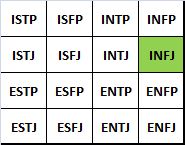 Have you ever have the experience of trying to work on a common challenge with a team member and it just feels like you are on different planets? You are using the same language yet are not communicating – they go off at apparently random tangents while you are trying to get a decision; they deluge you with detail when you ask about the big picture; you get upset when their cold logic threatens to damage team unity. The list is endless. If you experience this sort of confusion and frustration then you may be experiencing a personality clash – or to be more accurate a pyschological type mismatch.
Have you ever have the experience of trying to work on a common challenge with a team member and it just feels like you are on different planets? You are using the same language yet are not communicating – they go off at apparently random tangents while you are trying to get a decision; they deluge you with detail when you ask about the big picture; you get upset when their cold logic threatens to damage team unity. The list is endless. If you experience this sort of confusion and frustration then you may be experiencing a personality clash – or to be more accurate a pyschological type mismatch.
Carl Jung described a theory of psychological types that was later developed into the Myers-Briggs Type Indictator (MBTI). This extensively validated method classifies people into sixteen broad groups based on four dimensions that are indicated by a letter code. It is important to appreciate that there are no good/bad types or right/wrong types – each describes a mode of thinking: a model of how we gather information, make decisions and act on those decisions. Everyone uses all the modes of thinking to some degree – we just prefer some more than others and so we get more practice with them. The purpose of MBTI is not to “correct” someone elses psychologcial type – it is to gain a conscious and shared awareness of the effect of psychological types on interpersonal and team dynamics. For example, some tasks and challenges suit some psychological types better than others – they resonate – and when this happens these tasks are achieved more easily and with greater satisfaction. “One’s meat is another’s poison” sums the idea up. Just having insight into this dynamic is helpful because it offers new options to avoid frustrating, futile and wasteful conflict. So if you are curious find out your MBTI – you can do it on line in a few minutes (for example http://www.personalitytest.net/types/index.htm) and with that knowledge you can learn what your psychological type implies. Mine is INFJ …
